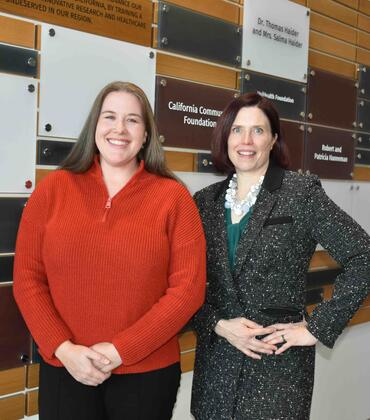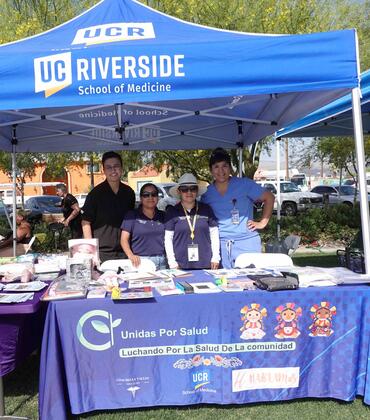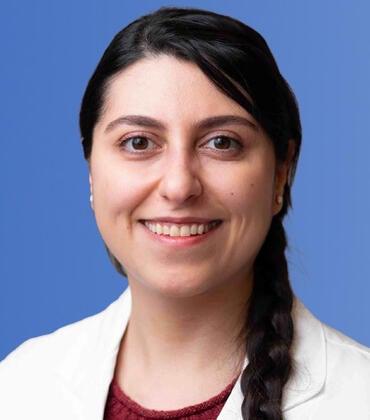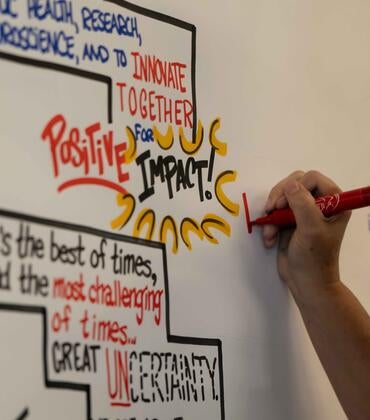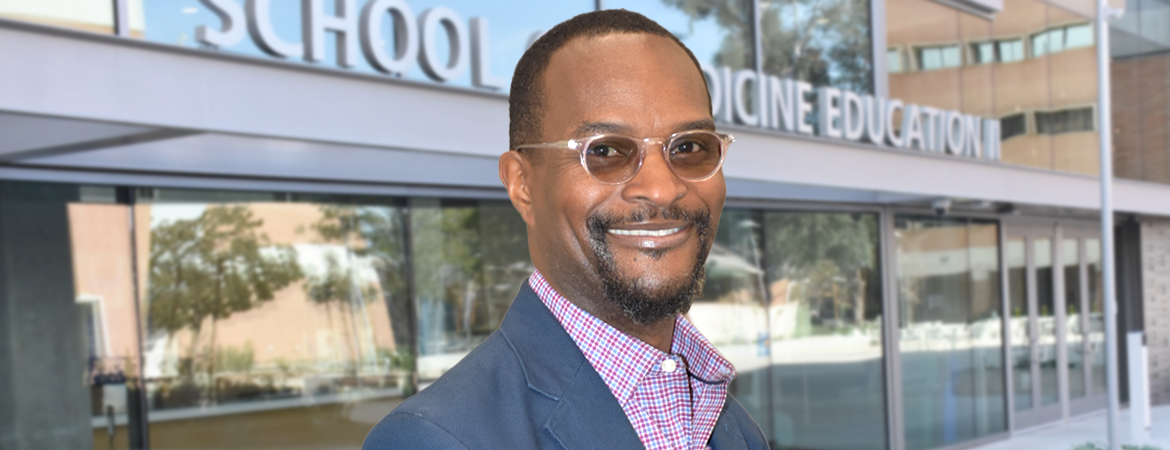
In high school, Mario Sims, PhD, read a book that would have a profound impact on his life and career: The Philadelphia Negro, by W. E. B. Du Bois. Du Bois, a sociologist and civil rights activist in the early 1900s, linked social conditions, environment, segregation, and other factors to health disparities among Black people living in Philadelphia at the time.
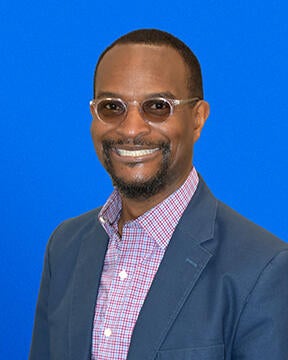
Growing up in Compton, California, Sims, now a distinguished professor and faculty director of the MPH program at UC Riverside School of Medicine, noticed many people in his neighborhood experiencing hypertension and heart attacks. As Sims wondered about the connection between people’s residential environment and their health conditions, Du Bois helped put his questions and observations in perspective.
In his book, “He systematically studied how these issues were linked to their mortality, life expectancy, and disease risk,” Sims explained.
It struck Sims that these issues were ongoing. Du Bois’ innovative work, and his trailblazing path as the first Black person to earn a PhD from Harvard, motivated Sims to pursue similar research in his own career.
As Sims read other works by Du Bois, he frequently returned to the first book, rereading it almost every year. “I always had in mind the things that W. E. B. Du Bois did,” Sims said, adding with a laugh that Du Bois almost felt like a mentor to him. The book reminded Sims of issues that had persisted over the years, presented potential methodologies to use in epidemiologic studies, and reinforced the intent of the study to understand and address issues facing the Black community.
Continuing Du Bois’ work
Following in Du Bois’ footsteps, Sims earned his PhD from the University of Wisconsin-Madison and later served as the chief science officer of the Jackson Heart Study in Mississippi, which is funded by the National Institutes of Health (NIH) and the National Heart, Lung, and Blood Institute (NHLBI). The study--the largest cohort study of Black people in the world--examines the reasons behind increased levels of cardiovascular disease among African American people with the goal of reducing health disparities. In Jackson, “I noticed we have some of the same things that W. E. B. Du Bois did over 100 years ago with the Philadelphia Blacks,” Sims recalled. The work gave him the chance to investigate the effects of social determinants of health conditions like poverty, segregation, stress, and neighborhood walkability on participants’ risk of heart disease.
After 32 years, Sims decided to return to Southern California to give back to his home region. In 2022, he joined the UCR SOM. “One reason I came to the Inland Empire versus LA is because LA has been well studied by a lot of universities, but not a lot of scholars have studied conditions that are going on in the Inland Empire,” Sims explained. “There’s plenty of work to be done and plenty of questions to be asked as well as answered here.”
Sims was excited to join UCR’s community of researchers who share his interest in pursuing health equity and studying social determinants of health. “You want to get a sense that your work is going to be appreciated and valued at all levels, from your department to the dean to the provost, and that’s what I’ve found here,” Sims said. He added that scholars across campus are open to collaboration, setting the stage for new and stronger research opportunities. “It's really welcoming and inviting to know that you don't have to always explain yourself; people here get it, and even if they don't, they want to understand and they recognize that we have to attack upstream structural issues,” Sims said.
The factor at the SOM that most impressed Sims was the Department of Social Medicine, Population, and Public Health. “Just that title lets you know that they're serious about wanting to understand what's going on regarding the social and population health impact of medicine as well as the role of the public health practitioner in understanding health inequities,” Sims said. “The fact that the department can exist within a medical school environment speaks even greater volumes, because that's telling you that that the clinical environment understands there's an intersection between the social and the clinical that can shape the disparities patients face.”
Learning from history
Even on the opposite side of the country from his previous work, Sims still has Du Bois on his mind at UCR. “Here I am in California, wanting to understand the same questions here in the Inland Southern California region” as in the past two decades in Jackson and a century ago in Philadelphia, he noted.
To Sims, the persisting similar problems with underlying structural racism and inequality mean that society and policymakers have ignored history and are therefore repeating it. “I think about that more than anything,” he said. “It is really sad and a shame that we're studying the same problems that existed over 100 years ago, and even further back than that.”
But Sims is working to bring change through efforts including research, mentoring, and a new Master of Public Health (MPH) program at the SOM.
Sims has published over 240 papers, with his recent research examining community interventions to improve cardiovascular health and increase health equity. He’s also planning to apply for grant funding to investigate the effect of certain policies, such as laws enacted to reduce evictions during the pandemic, on blood pressure among racial and ethnic groups in impacted areas. Sims explained that this type of research, some of which he’s already conducting on workplace sick policies, is particularly important to address the root causes of structural issues rather than the symptoms. “We often talk about changing behaviors to lower your risk of heart disease, but we should be looking at changing policies and systems that operate at the governance and political level to actually change people’s lives,” he said.
Mentorship serves as another way for Sims to effect change. For instance, Sims is working with Darwin Sumida, a pre-med undergraduate honors and capstone student at UCR, on research examining the impact of psychosocial well-being factors on reducing the prevalence of diabetes among Black adults. Together, they’ve identified links between higher levels of optimism and a lower prevalence of diabetes. “This is an important study because it tells us that if you want to look at preventing diabetes, then one target area will be to look at positive psychological well being,” Sims said. “It looks at the positive prevention side of things, and I think that gets at reducing inequities and disparities as well.”
Guiding mentees through research is valuable, but Sims’ motivating influence--like Du Bois before him--may be just as important.
For Chelsea Nwonwu, class of 2026, Sims’ encouragement has been as memorable as their joint research project on racial disparities and health. During a discussion of healthcare disparity complexities, Nwonwu found herself questioning her ability to influence change. “In that moment, Dr. Sims illuminated a profound truth: the passion and commitment I bring to researching and raising awareness about these disparities are already driving impactful change,” she recalled. “His words sparked an intense motivation within me, reinforcing that every step taken towards addressing these issues is a vital contribution to a brighter, more equitable future in healthcare.”
Training new leaders with UCR’s MPH program
Sims hopes to guide more students toward advocacy and meaningful change through UCR’s new MPH program, of which he is the faculty program director. Sims joined UCR in part to help launch the program, which will start in fall 2024.
The program was “a chance to build something for UCR as far as training public health practitioners and scholars to help reduce health disparities and promote and achieve health equity in the Inland Empire,” Sims explained. “I'll be able to teach my students to understand that these problems aren't new, and there needs to be policies in place to change those structural problems in order to have better health outcomes.”
Achieving health equity for all
Many issues have persisted over the centuries, but Sims has noticed some improvements throughout his career.
For one, he said there’s more awareness now. “I think this type of work, social determinants of health and social epidemiology, is more in the conversation than it was some 20 or 30 years ago,” he said, explaining that more people now understand that social, environmental, and other factors influence health beyond individual characteristics. He’s noticed the change through increased focus on these issues in conferences, grants, classes, and other areas. “That’s a big improvement because when you change people's minds, they have more of an intent to do something about the problem,” Sims said. “So that's a big deal as really it’s changing the culture in which we live.”
Sims’ goal is to eliminate health disparities and for all people to have health equity--and he thinks it’s attainable. “If we press forward, then we will make progress,” Sims said. “There is no doubt.”
He pointed to older generations of scholars seeing improvements over the decades, with current generations continuing to challenge the system before passing the work on to upcoming scholars. Sims also encouraged partnering with institutions and associations that share the same goals to further progress. “Then you can move the needle with greater might and muscle and power because you have more people and experts behind you,” he explained. “They’re collaborating with the same agenda in mind to achieve health equity.”
In the meantime, Sims continues to return to the book by Du Bois that began his journey, most recently rereading The Philadelphia Negro last November. “It’s a live document that’s always speaking new and innovative knowledge to me,” he said. Sims sees a direct connection between himself, Black scholars who mentored him as an undergraduate and graduate student, and Du Bois, and hopes to push the momentum of change forward while drawing from the past. “I think Du Bois would be proud to know that his work has been continued,” Sims said.
Still, Sims added that the author and sociologist would likely challenge people to do even more. “If Du Bois were here, he would probably ask: What are you doing to actually change it? What are you doing to rally people around changing upstream political policies? Are you electing people who are sensitive to some of these issues?” Sims said. “I think those are the kinds of things that he would challenge us on to get us thinking about things that we haven't considered and to actually bring about health equity.”
